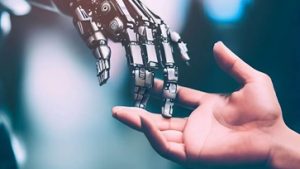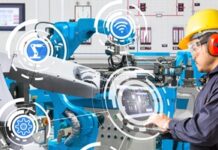
Artificial Intelligence (AI) is on everyone’s mind. When AI is applied to the fields of identity and security, the technology has driven massive progress in the past decade–progress that would not have been possible without the watchful eye of human supervision. Here, Geraldine Genest, VP of Data Science at Idemia, makes the argument for AI as our ally, and why it’s important to separate myths of the AI “singularity” from reality. Genest firmly asserts that AI allows a machine to learn on its own, but it cannot train a machine to think on its own.
“Today, you would be hard pressed to find a sector or person that does not rely on AI solutions for some aspect of their business or everyday life. At Idemia, we believe that AI is our ally—a complement to human intervention that enables us to work more efficiently, with increased precision, ” says Geraldine Genest.
According to Geraldine Genest, human intelligence remains essential in understanding the problems to be solved and designing the frameworks for AI systems. Deep learning algorithms, a subset of AI, have particularly propelled advancements in biometrics and document authentication to improve accuracy and user experience while reducing human bias. And all this matter because, backed by AI insights, decision makers are better equipped to make the right call.
Here we can look at the ways that AI has already transformed our every day lives to make things quicker and easier:
International travel
AI has completely transformed travel security by enabling automated identity verification processes at border controls using biometrics. Singapore recently announced plans to expand biometric checkpoints at all their air, land and sea border checkpoints; while in the United States, the TSA signed a $128M deal for the next-gen Credential Authentication Technology. These systems use AI algorithms that can match passport or identification document information with live biometric data, ensuring accurate identity verification and facilitating smoother passenger flows. AI algorithms ensure secure passenger verification, providing a pleasant journey while easing tasks for airport personnel and security officers.
Identity authentication
When it comes to fingerprint biometrics, deep learning technology makes it possible to read even damaged fingerprints, allows for quick contactless authentication, and provides an additional layer of security against “spoofing”. When it comes to other biometrics such as face and iris, AI algorithms can achieve liveness detection—the ability to confirm that the analysed data is, in fact, actually presented, in person, by their real owner—without asking the subject to perform any specific pose or movement, which drastically improves anti-fraud systems. In these applications, AI algorithms can ensure precise and reliable biometric identification, enabling faster and more secure authentication processes.
Connectivity
Nothing is driving the automotive industry and the user experience forward like improvements in connectivity—especially for connected cars. From digital keys and NFC solutions together with quantum-safe 5G and 6G for vehicle-to-everything communications, the integration of AI techniques into network management systems means connected cars can process and analyse data from various sensors, cameras, and other sources for enhanced safety, optimised performance, and personalised experiences for drivers and passengers. Genest explains that connected cars will leverage AI-powered 6G networks, ensuring fast, low-latency data transfer and seamless communication among vehicles, infrastructure, and the cloud.
Secure payments and intelligent manufacturing
Artificial intelligence is setting the course towards a smarter, more efficient, and resourceful tomorrow. When it comes to producing essential services such as payment cards, Idemia’s manufacturing facilities have embraced the change by replacing conventional assembly lines with a symphony of intelligent machines orchestrated by AI algorithms that optimise production processes and predict maintenance needs. In the manufacturing scenario, AI’s ability to anticipate possible malfunctions is crucial to product quality as well as overall factory efficiency.











